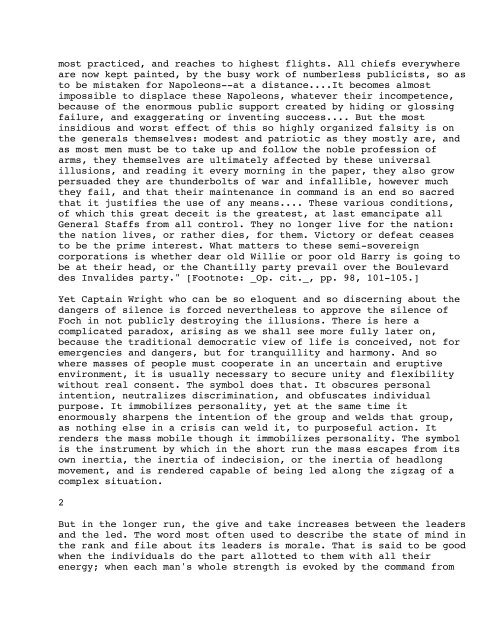PUBLIC OPINION by WALTER LIPPMANN TO FAYE LIPPMANN ...
PUBLIC OPINION by WALTER LIPPMANN TO FAYE LIPPMANN ...
PUBLIC OPINION by WALTER LIPPMANN TO FAYE LIPPMANN ...
You also want an ePaper? Increase the reach of your titles
YUMPU automatically turns print PDFs into web optimized ePapers that Google loves.
most practiced, and reaches to highest flights. All chiefs everywhere<br />
are now kept painted, <strong>by</strong> the busy work of numberless publicists, so as<br />
to be mistaken for Napoleons--at a distance....It becomes almost<br />
impossible to displace these Napoleons, whatever their incompetence,<br />
because of the enormous public support created <strong>by</strong> hiding or glossing<br />
failure, and exaggerating or inventing success.... But the most<br />
insidious and worst effect of this so highly organized falsity is on<br />
the generals themselves: modest and patriotic as they mostly are, and<br />
as most men must be to take up and follow the noble profession of<br />
arms, they themselves are ultimately affected <strong>by</strong> these universal<br />
illusions, and reading it every morning in the paper, they also grow<br />
persuaded they are thunderbolts of war and infallible, however much<br />
they fail, and that their maintenance in command is an end so sacred<br />
that it justifies the use of any means.... These various conditions,<br />
of which this great deceit is the greatest, at last emancipate all<br />
General Staffs from all control. They no longer live for the nation:<br />
the nation lives, or rather dies, for them. Victory or defeat ceases<br />
to be the prime interest. What matters to these semi-sovereign<br />
corporations is whether dear old Willie or poor old Harry is going to<br />
be at their head, or the Chantilly party prevail over the Boulevard<br />
des Invalides party." [Footnote: _Op. cit._, pp. 98, 101-105.]<br />
Yet Captain Wright who can be so eloquent and so discerning about the<br />
dangers of silence is forced nevertheless to approve the silence of<br />
Foch in not publicly destroying the illusions. There is here a<br />
complicated paradox, arising as we shall see more fully later on,<br />
because the traditional democratic view of life is conceived, not for<br />
emergencies and dangers, but for tranquillity and harmony. And so<br />
where masses of people must cooperate in an uncertain and eruptive<br />
environment, it is usually necessary to secure unity and flexibility<br />
without real consent. The symbol does that. It obscures personal<br />
intention, neutralizes discrimination, and obfuscates individual<br />
purpose. It immobilizes personality, yet at the same time it<br />
enormously sharpens the intention of the group and welds that group,<br />
as nothing else in a crisis can weld it, to purposeful action. It<br />
renders the mass mobile though it immobilizes personality. The symbol<br />
is the instrument <strong>by</strong> which in the short run the mass escapes from its<br />
own inertia, the inertia of indecision, or the inertia of headlong<br />
movement, and is rendered capable of being led along the zigzag of a<br />
complex situation.<br />
2<br />
But in the longer run, the give and take increases between the leaders<br />
and the led. The word most often used to describe the state of mind in<br />
the rank and file about its leaders is morale. That is said to be good<br />
when the individuals do the part allotted to them with all their<br />
energy; when each man's whole strength is evoked <strong>by</strong> the command from





